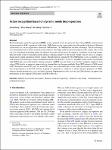Thông tin tài liệu

| Nhan đề : |
| Action recognition based on dynamic mode decomposition |
| Tác giả : |
| Shuai, Dong Weixi, Zhang Wei, Wang |
| Năm xuất bản : |
| 2021 |
| Nhà xuất bản : |
| Springer |
| Tóm tắt : |
| Based on dynamic mode decomposition (DMD), a new empirical feature for quasi-few-shot setting (QFSS) skeleton-based action recognition (SAR) is proposed in this study. DMD linearizes the system and extracts the modes in the form of flattened system matrix or stacked eigenvalues, named the DMD feature. The DMD feature has three advantages. The first advantage is its translational and rotational invariance with respect to the change in the localization and pose of the camera. The second one is its clear physical meaning, that is, if a skeleton trajectory was treated as the output of a nonlinear closed-loop system, then the modes of the system represent the intrinsic dynamic property of the motion. Finally, the last one is its compact length and its simple calculation without training. The information contained by the DMD feature is not as complete as that of the feature extracted using a deep convolutional neural network (CNN). |
| Mô tả: |
| CC BY |
| URI: |
| https://link.springer.com/article/10.1007/s12652-021-03567-1 https://dlib.phenikaa-uni.edu.vn/handle/PNK/8511 |
| Bộ sưu tập |
| OER - Kỹ thuật điện; Điện tử - Viễn thông |
XEM MÔ TẢ
258
XEM TOÀN VĂN
106
Danh sách tệp tin đính kèm:
